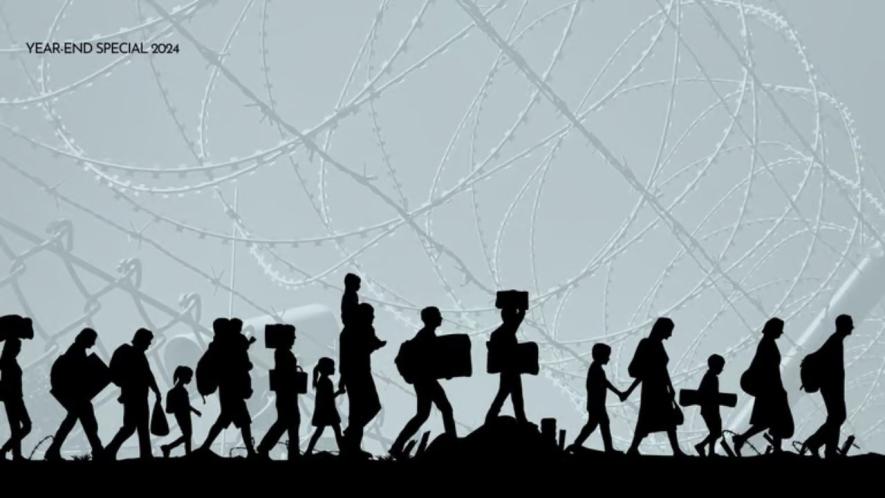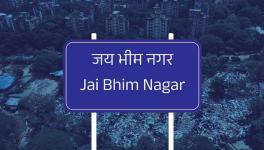The Year That Was—4: Long Road to Justice for a Stateless Refugee

Ahmed Almakki’s case is a stark testament to the plight of Stateless individuals and the systemic challenges in ensuring their rights are protected. His year-long legal battle, fought tirelessly by his counsel, Akram Khan, highlights not just bureaucratic indifference but also the resilience required to protect fundamental human rights under the law.
A troubling journey of detention and uncertainty
Ahmed Almakki, a Rohingya refugee, was apprehended on September 21, 2014 by the authorities at the Padav Police Station, Gwalior. Lacking valid citizenship documents, he was charged under Sections 14(3,2) of the Foreigners Act, 1946 and Section 3 of the Passport Act, 1920. Sentenced to three years of rigorous imprisonment in 2015, Ahmed completed his term on September 22, 2017.
However, instead of being deported or rehabilitated, Ahmed found himself placed in a makeshift ‘temporary detention centre’ within the Padav Police Station, a facility wholly unfit for human habitation. He endured months of physical and mental harassment, with no resolution in sight regarding his citizenship or future.
In June 2018, after escaping the detention center and being rearrested in Hyderabad, Ahmed faced further criminal proceedings under Section 14 of the Foreigners Act. Following another trial, he was sentenced again, completing his second term on July 2, 2021.
Instead of being deported or rehabilitated, Ahmed found himself placed in a makeshift ‘temporary detention centre’ within the Padav Police Station, a facility wholly unfit for human habitation.
Yet, even after this, he was detained indefinitely in Central Jail, Gwalior, with no clarity on his status or deportation process, though the collector, Gwalior has no right to pass such an Order to declare a jail as a detention centre.
The turning point: A year-long legal battle
The prolonged detention led Ahmed’s counsel, Akram Khan, to file a habeas corpus petition under Article 226 of the Constitution in early 2023 before the High Court of Madhya Pradesh, Gwalior Bench. The petition sought to challenge the continued illegal detention and demand Ahmed's transfer to a proper detention center until his deportation could be resolved.
Over the course of a year, the case saw numerous hearings, highlighting the state and Union government’s failure to adequately address Ahmed’s status. Key legal arguments included:
Violation of fundamental rights: Ahmed’s detention in a jail environment after he had served his sentence period was a direct violation of Article 20, which offers protection against the conviction of offences in certain ways, and Article 21, which guarantees the right to life and dignity, of the Indian Constitution.
International obligations ignored: India’s obligations under the United Nations High Commissioner for Refugees (UNHCR) and other international frameworks to provide humane treatment to refugees were brought to light.
Inadequate detention facilities: The petition emphasised that detention centers must comply with the Model Detention Center Manual, ensuring basic amenities such as hygiene, safe drinking water, medical care and humane living conditions. However, violating all these principles, the State authorities had declared Central Jail, Gwalior as a detention centre.
Judicial observations and directions: The high court, while addressing the case, expressed serious concerns over the systemic lapses.
Failure to ensure basic human dignity: The court noted that detaining Ahmed in a prison environment violated the principles of natural justice and human dignity.
Absence of guidelines: The Union government admitted its helplessness in dealing with such cases due to a lack of clear guidelines, further compounding the issue.
Citing Supreme Court precedents: Relying on the landmark judgment in Bhim Singh versus Union of India, the court reiterated that foreign nationals who have completed their sentences cannot be kept in prison indefinitely and must be transferred to proper detention centers with humane conditions.
In its final Order dated December 10, 2024, the court issued three major directives:
1. Ahmed Almakki was to be transferred immediately to a proper detention center in Assam, pending the resolution of his citizenship and deportation.
2. The detention center was to provide all basic facilities as per the Model Detention Center Manual, ensuring Ahmed’s dignity and well-being.
3. The Union and state governments were directed to expedite communications with Saudi Arabia and Bangladesh to resolve the petitioner’s status.
Ahmed’s case shines a light on the systemic neglect and rights violations faced by refugees and Stateless individuals.
The role of the Bangladesh and Saudi Arabia
The embassies of Bangladesh and Saudi Arabia were central to the resolution of Ahmed Almakki’s case, but their roles revealed significant gaps in addressing issues of statelessness and diplomatic accountability. The Saudi Arabian embassy was the first to be approached by Indian authorities for confirmation of the petitioner’s citizenship. Despite Almakki’s claim that he was born in Saudi Arabia and had lived there for much of his life as a refugee, the Saudi Arabian authorities firmly denied his citizenship.
They identified him as a Bangladeshi national, emphasising that he held no legal ties to Saudi Arabia, despite his family’s historical residence there. This led Indian authorities to turn to the Bangladesh High Commission for verification and subsequent repatriation.
The Bangladesh High Commission, however, failed to provide a timely response to the Indian government's repeated requests. Although the petitioner was granted consular access on November 15, 2018, the High Commission did not issue a conclusive statement confirming his nationality or willingness to repatriate him.
The absence of any substantial action from Bangladesh prolonged the petitioner’s legal limbo, forcing Indian authorities to keep him in detention without resolution. Almakki has since remained under continuous correspondence with the Bangladesh Division of the Ministry of External Affairs, India, as efforts to obtain clarification and facilitate his deportation continue.
The lack of responsiveness from the Bangladeshi authorities exacerbated Almakki’s plight, as he endured years of detention in suboptimal conditions. It was only through persistent judicial interventions, particularly by the High Court of Madhya Pradesh, that attention was brought to the prolonged delays by both the Bangladeshi High Commission and the broader diplomatic process. These delays not only left Almakki without a legal identity but also raised serious questions about the accountability of diplomatic missions in resolving disputes regarding statelessness.
This case illustrates the critical role of embassies in cases of suspected illegal immigration and statelessness. While Saudi Arabia's firm denial provided clarity about Almakki’s non-citizenship status there, Bangladesh's inaction left Indian authorities with no clear path forward. Without proactive cooperation from the diplomatic missions, individuals such as Almakki remain caught in indefinite detention, their fundamental rights under international law and the Indian Constitution violated. This highlights the urgent need for enhanced bilateral cooperation and adherence to international norms in handling stateless persons and refugees.
Ahmed’s case shines a light on the systemic neglect and rights violations faced by refugees and Stateless individuals. It underscores the critical need for India to adopt comprehensive policies that balance national security concerns with its obligations under international law.
While Ahmed’s legal battle resulted in significant directives, the lack of proactive measures by the authorities led to years of suffering and deprivation. Refugees and Stateless individuals are entitled to fundamental rights, including protection from inhumane treatment, access to legal remedies and dignified living conditions.
Ahmed’s ordeal reminds us that justice delayed is justice denied. As India continues to deal with global migration challenges, it must prioritise creating robust administrative frameworks that ensure the rights and dignity of all individuals.
Ahmed Almakki’s struggle should serve as a clarion call for reform, highlighting the importance of legal vigilance and the relentless pursuit of justice for the most vulnerable.
Although the petitioner was granted consular access on November 15, 2018, the High Commission did not issue a conclusive statement confirming his nationality or willingness to repatriate him.
Difference between jail and detention centre
A jail is a facility meant to house individuals accused or convicted of crimes, governed by the Prison Act, 1894 and criminal laws. It is punitive in nature, with strict security and limited freedoms.
In contrast, a detention center is an administrative holding facility for individuals such as illegal immigrants, refugees or Stateless persons, governed by the Foreigners Act, 1946 and the Model Detention Center guidelines. Detention centers are non-punitive, meant to restrict movement until deportation or the resolution of legal status.
The key difference lies in purpose and treatment: jails are for punishment and criminal sentences, while detention centers serve as temporary shelters for those awaiting administrative decisions.
In cases like Ahmed Almakki’s, where individuals are detained after completing their sentence due to unresolved citizenship, confining them in jails violates their fundamental rights under Articles 20 and 21 of the Indian Constitution, as such detention is not meant to be punitive.
Supreme Court on Stateless refugees
The Supreme Court of India has addressed the rights of Stateless refugees in several landmark cases, emphasising the importance of upholding human dignity, fundamental rights, and international humanitarian obligations.
Bhim Singh versus Union of India dealt with the plight of foreign nationals, including Stateless individuals, who had completed their sentences but were still detained in jails due to unresolved citizenship or repatriation issues.
The court held that such detention violates the basic principles of human dignity and Articles 20 and 21 of the Constitution. It directed the government to transfer such individuals to detention centers with adequate facilities until their deportation could be resolved, ensuring they are not treated as criminals after the completion of their sentence.
In National Human Rights Commission versus State of Arunachal Pradesh, the Supreme Court addressed the rights of the Chakma refugees, emphasising that even non-citizens are entitled to protection under Article 21 of the Constitution.
The court directed the State to ensure the safety and dignity of Chakma refugees and prevent forced repatriation, reaffirming India’s commitment to human rights regardless of citizenship status.
Mohammad Salimullah and Anr. versus Union of India involved the deportation of Rohingya refugees to Myanmar. The court acknowledged India’s international obligations but prioritised national security and allowed the government to proceed with deportation. However, it reiterated that any action must be in accordance with due process and respect for fundamental rights.
The court held that such detention violates the basic principles of human dignity and Articles 20 and 21 of the Constitution.
Key principles from the Supreme Court
-
Stateless refugees and foreign nationals are entitled to protection under Article 21, ensuring the right to life and dignity.
-
Indefinite detention after serving a sentence or without due process is unconstitutional.
-
Detention centers, not jails, should house such individuals to ensure humane treatment.
-
India, while not a signatory to the 1951 Refugee Convention, must adhere to its constitutional and international human rights obligations.
AHMED ALMAKKI ALIAS AHMED Versus THE STATE OF MADHYA PRADESH AND OTHERS .pdf
Get the latest reports & analysis with people's perspective on Protests, movements & deep analytical videos, discussions of the current affairs in your Telegram app. Subscribe to NewsClick's Telegram channel & get Real-Time updates on stories, as they get published on our website.























